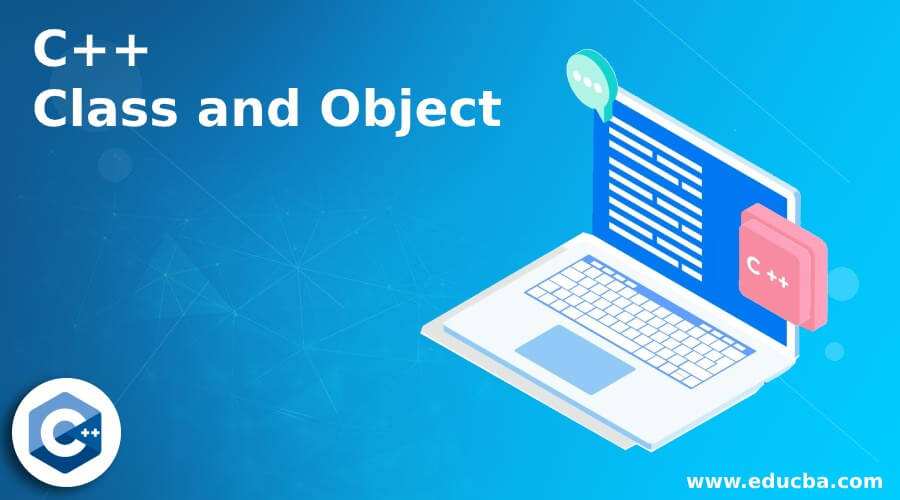Updated April 12, 2023

Introduction to C++ Class and Object
C++ Classes and Objects are those which are essential for programming. a class in c++ is the structure block, that prompts object-oriented programming. An object is an occurrence of a class. it is a client characterized information type, which holds its own information individuals and part works, which can be gotten to and utilized by making an occasion of that class. A C++ class resembles a diagram for an article. A class is a client characterized information type which has information on individuals and part works.
Information individuals are the information factors and part works are the capacities used to control these factors and together these information individuals and part works characterize the properties and conduct of the articles in a class. At the point when a class is characterized, no memory is designated except for when it is started up that is, an object which is created, then memory is assigned.
Syntax and Parameters
This is the general syntax for classes and objects in C++.
ClassTypeObjectTypeWhere,
- ClassType represents the name of the class that has to be provided.
- ObjectType represents the name of the object that has to be assigned within the class.
- A class is characterized in C++ utilizing the watchword class followed by the name of the class. The assortment of a class is characterized inside the wavy sections and ended by a semicolon toward the end.
How do Classes and Objects work in C++?
Now we see various examples of how classes and objects work in C++.
Example #1 – Multiple Objects with A Single Class
Code:
#include <string>
#include <iostream>
using namespace std;
class Auto {
public:
string company;
string name;
int date;
};
int main() {
Auto autoObj1;
autoObj1.company = "Honda";
autoObj1.name = "City";
autoObj1.date = 2010;
Auto autoObj2;
autoObj2.company = "Mercedes";
autoObj2.name = "E";
autoObj2.date = 2021;
cout<< autoObj1.company << " " << autoObj1.name << " " << autoObj1.date << "\n";
cout<< autoObj2.company << " " << autoObj2.name << " " << autoObj2.date << "\n";
return 0;
}Output:

Here in the above program, we first create a class called auto, and public is the access specifier which we need to assign before entering the values. Then, we enter the strings of the class auto. after that, we create the first object and provide the values of the specific string and integer values of the class auto and similarly we create the second object and assign the values in that as well and finally run the code. The program is implemented and the output of the two objects in the class auto is shown in the above snapshot.
Example #2 – Single Object with A Single Class
Code:
#include <string>
#include <iostream>
using namespace std;
class Something {
public:
string String;
int Num;
};
int main() {
Something Obj;
Obj.String = "Span";
Obj.Num = 25;
cout<<Obj.String<< "\n";
cout<<Obj.Num;
return 0;
}Output:

In the above program, we first create a class called something and then define a single object inside that class. similar to the previous program, we assign values in that particular object and then finally implement the code. hence, the output is shown in the above snapshot. The public information individuals are additionally gotten to similarly given anyway the private information individuals are not permitted to be gotten to straightforwardly by the item. getting to an information part relies entirely upon the entrance control of that information part.
All the part capacities characterized inside the class definition are naturally inline, however, you can likewise make any non-class work inline by utilizing catchphrase inline with them. Inline capacities are real capacities, which are replicated wherever during the gathering, as pre-processor large scale, so the overhead of capacity calling is decreased.
At the point when a class is characterized, just the particular for the article is characterized; no memory or capacity is distributed. To utilize the information and access capacities characterized in the class, you have to make objects. The information individuals and part elements of the class can be gotten to utilizing the dot(‘.’) administrator with the item. For instance, if the name of the item is obj and you need to get to the part work with the name printName() at that point you should compose obj.printName().
At the point when you characterize a class, you characterize an outline for an information type. This doesn’t really characterize any information, however, it characterizes what the class name implies, that is, the thing that an object of the class will comprise of and what tasks can be performed on such an article.
Conclusion – C++ Class and Object
Finally, I would like to conclude by stating that the principle reason for C++ writing computer programs is to add object directly to the C programming language and classes are the focal component of C++ that supports object-arranged programming and are regularly called client characterized types. A class is utilized to indicate the type of an article and it joins information portrayal and techniques for controlling that information into one flawless bundle. The information and capacities inside a class are called individuals from the class.
Recommended Articles
This is a guide to C++ Class and Object. Here we also discuss the introduction and how classes and objects works in c++? along with syntax and parameters. You may also have a look at the following articles to learn more –


